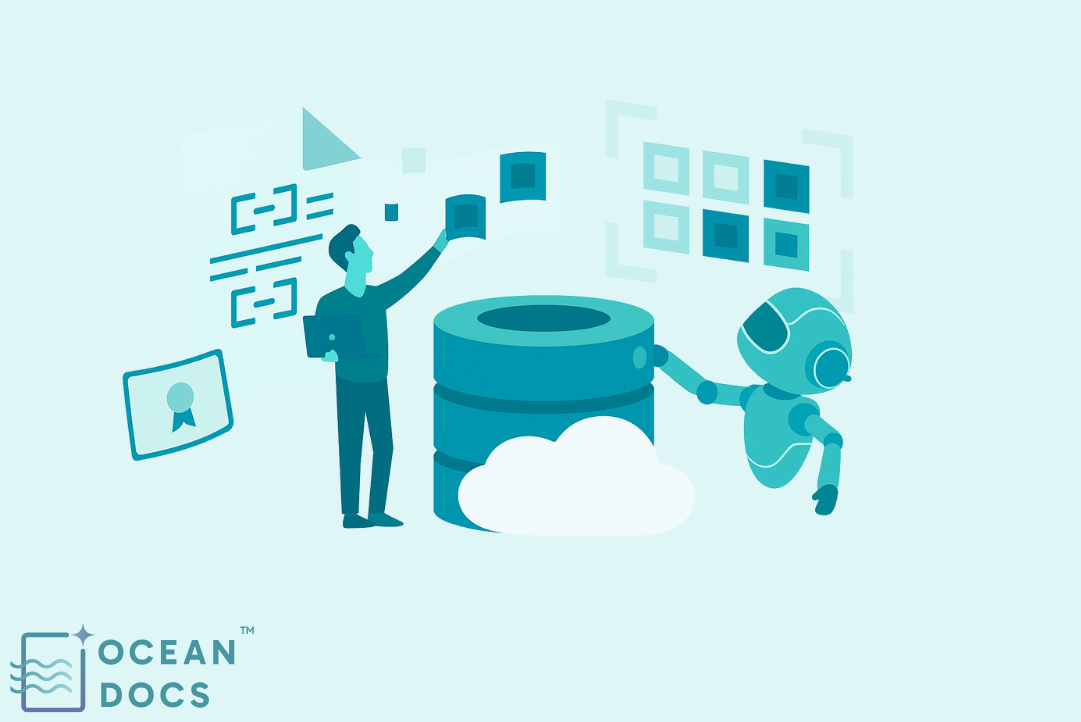
What Is Document Intelligence and How Does It Work for Shipping
October 14, 2025 By OceanDocs AI
In the maritime industry, thousands of shipping documents move between ports, vessels, and authorities every day. Each of these documents, such as Fire Control Plans, crew certificates, and pollution prevention records, is essential for smooth operations and maritime compliance. Yet, managing this volume manually can lead to errors, delays, and inspection failures. This is where document intelligence is changing the game for shipping.
Understanding Document Intelligence
Document intelligence is the use of Artificial Intelligence (AI) and machine learning to read, classify, and process documents automatically. It combines Automated Document Processing, Natural Language Processing (NLP), and computer vision to extract data from PDFs, scanned copies, or handwritten records.
In shipping documentation, it helps identify and organize records such as MARPOL certificates, SOLAS safety documents, ISM Code manuals, and STCW training logs. These are critical for demonstrating regulatory adherence during audits and Port State Control inspections.
Simply put, document intelligence acts as a digital assistant that ensures your maritime documentation is always up to date, searchable, and ready for inspection.
Why Shipping Needs Smarter Documentation
Maritime operations depend on accuracy. A missing certificate or outdated approval can cause costly detentions. Regulations such as IMO regulations, the ISPS Code, and Ballast Water Management protocols require that vessels maintain accurate and accessible records.
Traditional filing systems or spreadsheets make it difficult to keep track of all these ship documents, especially across multiple vessels. Smart tools built with AI in shipping can instantly verify compliance documents, flag missing information, and organize them according to the Safety Management System (SMS) or HSEQ standards.
For example, if a vessel’s LSA Code or IMDG Code document is about to expire, the system can alert the ship management team before it becomes an issue.
How Document Intelligence Works in Maritime Operations
Modern maritime software solutions use document intelligence through four key stages:
1. Data Capture
The system captures data from physical and digital shipping documentation—from Nautical Charts and Electronic Logbooks to Port Authorities notices. AI models trained on maritime terminology recognize formats used in ISM Code forms, MARPOL annexes, or SIRE Vetting checklists.
2. Data Extraction
Through machine learning and OCR, the system extracts critical details like vessel name, certificate date, and inspection status. It automatically categorizes them under sections such as vessel safety, pollution prevention, or port operations.
3. Validation and Classification
The extracted data is compared against templates and maritime regulations. This ensures every file meets compliance documentation standards for Port State Control, HSEQ, and Maritime Security.
4. Integration and Access
The processed information is stored in a document management system or ship management software, making it accessible to authorized users across departments—from fleet management to crew management. This integration improves audit readiness and inspection readiness across vessels and ports.
Benefits of Using Document Intelligence in Shipping
1. Better Compliance and Reduced Risk
With automatic checks against IMO regulations and SOLAS definitions, the risk of missing a mandatory document drops significantly. This ensures smooth Port State Control inspections and avoids delays.
2. Increased Operational Efficiency
AI automates repetitive tasks like document sorting and renewal tracking. This allows ship management companies to focus on more strategic aspects of fleet management and port logistics.
3. Enhanced Transparency
All documents can be accessed through a centralized dashboard. Marine Technology platforms provide real-time visibility into ship surveys, risk assessment reports, and Safety Management activities, helping teams prepare better for audits or SIRE inspections.
4. Improved Safety and Sustainability
Digital intelligence supports compliance with maritime environmental compliance frameworks like MARPOL and Ballast Water Management. It also helps ensure crew safety by monitoring documents related to Fire Control Plans and navigation safety.
Use Cases Across the Maritime Industry
-
Fleet Ship Management: Managing digital records for hundreds of vessels with smart indexing and renewal alerts.
-
Tanker Ship Management: Ensuring each tanker’s ISGOTT and Pollution Prevention records meet HSEQ standards.
-
Seafarer Training: Tracking STCW certificates and onboarding documents for every crew member.
-
Port Operations: Coordinating port logistics and clearance processes through automated document verification.
-
Audit Readiness: Maintaining a paper-free trail that’s always aligned with maritime compliance software requirements.
The Future of Smart Shipping Documentation
The next stage of smart shipping lies in combining document intelligence with predictive analytics. Future systems will not only manage but also forecast compliance needs based on evolving geopolitical risks and inspection trends.
This will help ship management teams move from reactive compliance to proactive monitoring—an essential step toward digitalization in the maritime industry. As AI for regulatory compliance continues to improve, it will bring automation, accuracy, and insight to every part of the documentation cycle.
Conclusion
OceanDocs AI is changing how the maritime industry manages its most important records. The platform uses document intelligence to organize, update, and verify shipping documents such as MARPOL logs and ISM Code manuals.
By turning scattered paperwork into accurate, accessible data, OceanDocs AI helps companies improve maritime compliance, reduce manual effort, and maintain better control over operations.
For shipowners, operators, and fleet management teams, using OceanDocs AI brings greater efficiency, safety, and transparency to everyday maritime work.